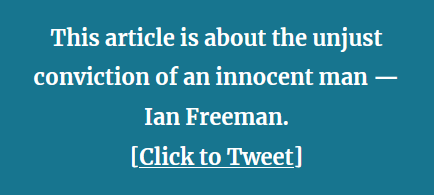
News Link • Courtroom and Trials
The Unjust Conviction of an Innocent Man: The Ian Freeman Case, Part 1
• Jacob Hornberger - FFFPart 1 | Part 2 [to be published]
If one googles the name "Ian Freeman" and "bitcoin," the result will be hundreds of articles  describing Freeman as a "fraudster." That's because immediately after Freeman's sentencing in a criminal case in a U.S. District Court in New Hampshire on October 2, 2023, the U.S. Attorney's office in New Hampshire sent out a press release in which Freeman was labeled a "fraudster."
describing Freeman as a "fraudster." That's because immediately after Freeman's sentencing in a criminal case in a U.S. District Court in New Hampshire on October 2, 2023, the U.S. Attorney's office in New Hampshire sent out a press release in which Freeman was labeled a "fraudster."
There is one big problem, however, with that description: Freeman was never convicted of fraud, and the U.S. Attorney's office knew that when it sent out that press release on the day of his sentencing.
That's not to say, however, that there wasn't any evidence of fraud in Freeman's trial. There was, but it was fraud committed by the U.S. government official whose testimony the U.S. Attorney used to secure a conviction of Freeman on a bogus charge of "money laundering." Although the jury found Freeman guilty of money laundering based on the sworn testimony of that agent, the federal judge presiding over the trial, Judge Joseph Laplante, as we see later in this article, threw out that finding of guilt and acquitted Freeman of the money-laundering charge.
Nonetheless, Freeman was convicted on other charges — conspiracy to engage in money laundering, failing to register his bitcoin business with the federal government, conspiring to fail to register his bitcoin business with the federal government, and income-tax evasion, all of which, as we will see later in this article, were as bogus as the money-laundering conviction that the judge rightly threw out.
In short, this article is about the unjust conviction of an innocent man — Ian Freeman — who is now serving an eight-year jail sentence that was meted out to him by the same judge who threw out that bogus money-laundering conviction.



































